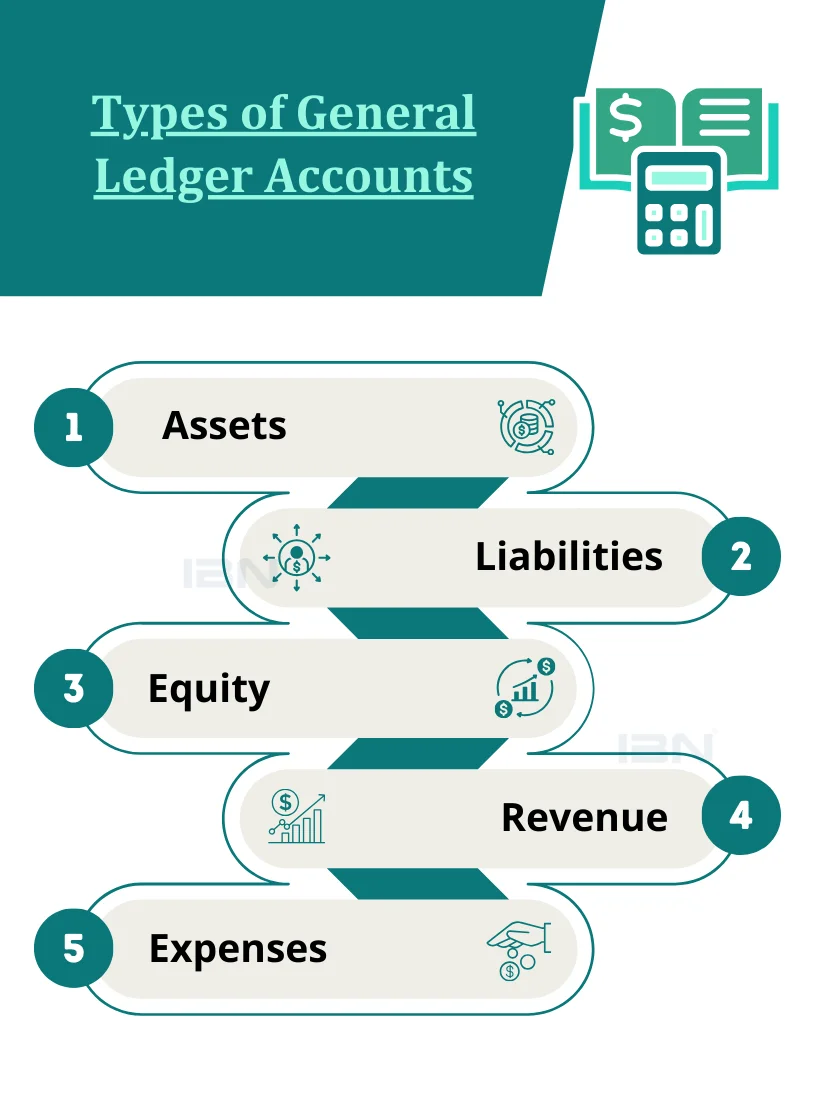Regarding accounting and financial management, the general ledger (GL) is at the heart of every business’s accounting system. It’s the central repository that records all the financial transactions of a company, providing a comprehensive view of its financial health. Understanding the different types of general ledger accounts is crucial for businesses to ensure accurate record-keeping and to maintain a clear picture of their financial status.
In this blog, we’ll delve into the various types of general ledger accounts, how they function, and why they are vital for effective financial management.

Table of Contents
- What is a General Ledger?
- Types of General Ledger Accounts
- The Importance of Balancing General Ledger Accounts
- How General Ledger Accounts Drive Financial Decision-Making
- Challenges in Managing General Ledger Accounts
- Conclusion
- General Ledger Accounts FAQs
What is a General Ledger?
A general ledger is essentially the master record of all financial transactions made within a business. It summarizes all the information recorded in sub-ledgers, such as sales, purchases, inventory, and payroll, consolidating them into one comprehensive record. The GL provides the basis for the creation of financial statements, including the balance sheet and income statement, making it a cornerstone of financial reporting.
Types of General Ledger Accounts
The general ledger is divided into several different types of accounts, each serving a unique purpose. There are five main types of accounts:
- Assets
Assets are resources owned by a company that has economic value and can provide future benefits. These are further divided into current assets, such as cash, accounts receivable, and inventory, and non-current assets like property, plant, equipment, and intangible assets (e.g., patents or trademarks). Asset accounts are crucial as they provide a snapshot of what the company owns and how these resources are being utilized. - Liabilities
Liabilities represent the company’s obligations or debts that it needs to settle in the future. These can be current liabilities, which are due within a year (e.g., accounts payable, short-term loans), or long-term liabilities that are due after a year (e.g., bonds payable, long-term leases). Properly managing liabilities is essential for maintaining the company’s creditworthiness and financial stability.

- Equity
Assets are resources owned by a company that has economic value and can provide future benefits. These are further divided into current assets, such as cash, accounts receivable, and inventory, and non-current assets like property, plant, equipment, and intangible assets (e.g., patents or trademarks). Asset accounts are crucial as they provide a snapshot of what the company owns and how these resources are being utilized. - Revenue
An income account tracks the income generated by the company’s primary business activities, such as the sale of products or services. It reflects the company’s ability to earn profits and continue operations. Common revenue accounts include sales revenue, service revenue, and interest income. Accurate revenue tracking is essential for understanding a company’s performance and growth potential. - Expenses
Expense accounts record the costs incurred by the company to generate revenue. This includes operational expenses like rent, utilities, salaries, and cost of goods sold (COGS). Expenses are deducted from revenue to determine the net income of the business. Properly categorizing and tracking expenses is vital for cost control and profitability analysis.
The Importance of Balancing General Ledger Accounts
One of the fundamental principles of accounting is that the general ledger must always be balanced. This means that the total debits must equal the total credits across all accounts. If the general ledger is not balanced, it indicates that there may be errors in the accounting records that need to be addressed. A balanced general ledger ensures the accuracy and reliability of financial statements, which are used by management, investors, and regulatory bodies to make informed decisions.
How General Ledger Accounts Drive Financial Decision-Making
The insights gained from analyzing general ledger accounts are invaluable for making strategic financial decisions. For example:
- Cash Flow Management: By closely monitoring asset and liability accounts, businesses can better manage their cash flow, ensuring they have enough liquidity to meet short-term obligations.
- Profitability Analysis: Revenue and expense accounts provide a clear picture of the company’s profitability. Analyzing these accounts helps in identifying areas where costs can be reduced or revenues increased.
- Investment Decisions: Equity accounts reveal the financial health and stability of the business, guiding decisions on reinvestment, dividend distribution, or attracting new investors.
- Compliance and Reporting: Maintaining accurate general ledger accounts is essential for compliance with accounting standards and regulations. It also ensures that financial statements are accurate and can withstand scrutiny during audits.
Challenges in Managing General Ledger Accounts
While general ledger accounts are crucial for accurate financial reporting, managing them can be challenging. Common issues include:
- Complexity: As businesses grow, the number of transactions increases, making it harder to manage and reconcile general ledger accounts.
- Errors: Mistakes in data entry, such as incorrect amounts or misclassification of accounts, can lead to imbalances and inaccuracies in financial reporting.
- Integration: For businesses using multiple systems or software for different aspects of their operations, integrating these into a single general ledger can be complex and prone to errors.
To mitigate these challenges, many businesses invest in accounting software that automates much of the general ledger management process, ensuring accuracy and efficiency.
Conclusion
Understanding and effectively managing the different types of general ledger accounts is vital for any business’s financial health. By keeping accurate records of assets, liabilities, equity, revenue, and expenses, businesses can ensure their financial statements are reliable and their decision-making processes are well-informed. While managing these accounts can be complex, leveraging the right tools and practices can make it more manageable, leading to better financial management and long-term success.
At IBN Technologies, we specialize in helping businesses streamline their financial and accounting processes. Our expertise in managing general ledger accounts ensures that your financial records are accurate, up-to-date, and compliant with the latest accounting standards. Whether you run a small business or a large corporation, our customized solutions are designed to meet your specific needs, providing peace of mind and the ability to focus on what you do best—growing your business.
Ready to strengthen your financial management? Contact our expert team today for a free consultation and discover how IBN Technologies can help optimize your accounting processes, ensuring your general ledger is always in check and your financial stability is secured.
General Ledger Accounts FAQs
-
What is GL entry?
A General Ledger (GL) entry is a financial transaction record in a company’s accounting system, affecting specific accounts in the ledger.
-
How many types of GL are there?
There are two main types: a Standard General Ledger (used for regular financial transactions) and a Subledger (detailed records supporting the General Ledger).
-
What are the different types of ledger accounts?
The different types of ledger accounts include Asset Accounts, Liability Accounts, Equity Accounts, Revenue Accounts, and Expense Accounts.



